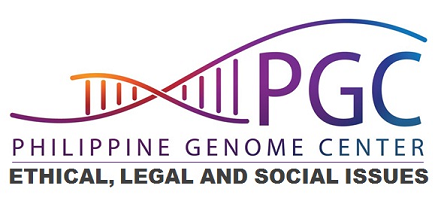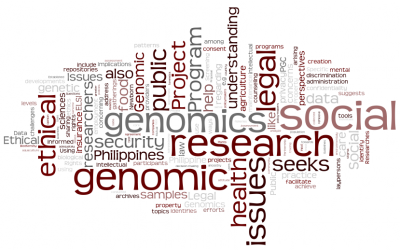“Ethical, Legal, Social Issues” (ELSI) Program

PHILIPPINE GENOME CENTER (PGC) -
ETHICAL, LEGAL AND SOCIAL ISSUES (ELSI) PROGRAM
ELSI PROGRAM MEMBERS

Core Group
Assoc. Prof. Peter Sy - Program Director
Atty. Renato Manaloto - Asst. Program Director
Atty. Marcia Ruth Gabriela Fernandez
Dr. Salvador Eugenio Caoili
Dr. Ma. Mercedes Planta
Scientific Advisory Committee
Dr. Leonardo de Castro
Dr. Reidar K. Lie
Dr. Marita Reyes
Research Assistant
Jefferson Llaguno
CONTACT US
2F NIMBB Bldg., National Science Complex
University of the Philippines, Diliman, Quezon City
Tel (632) 9818 744 / Phone (639) 19 440 2160
Website: pgc.up.edu.ph
Email: pgc.elsi@gmail.com
About the ELSI Program
Established in 2011, the ELSI (Ethical, Legal, Social Issues in Genomics) Program of the Philippine Genome Center (PGC) is a multidisciplinary initiative that seeks to identify and deliberate the ethical, legal, and social issues in genomics. It works for the integration of ethical, legal, and social considerations into the practice of genomic research in the Philippines.
RESEARCH FOCUS
- + Public health implications of genomics;
- + Current legal and social challenges of genomics researchers in the country;
- + Food security and environmental sustainability;
- + Social acceptability of genomic research in agriculture;
- + Informed consent, privacy, confidentiality; and
- + Level of understanding of participants in genomic research.
STRATEGIC GOAL
To help achieve greater clarity in the public appreciation of genomic research and the scientists' understanding of public knowledge and attitude towards science.
STRATEGIC OBJECTIVES
- 1. Identify and deliberate the ethical, legal, and social issues in genomics in the Philippine setting.
- 2. Investigate governance issues in the creation, maintenance, and administration of repositories and archives of genetic materials.
- 3. Engage the scientific community in ways that help make Philippine genomic research a reflexive, productive, socially responsible enterprise.
- 4. Facilitate conversation among health care providers, policy-makers, researchers, opinion-makers, laypersons, regarding genomics in the Philippines.
Priority Issues and Projects
These are the priority projects and issues of the ELSI Program:[1]
1. Workshops, Seminars, Conferences, or Colloquia on the Ethical, Legal, and Social Issues in and Challenges to Genomics in the Philippines
To be conducted at least twice a year, these are gatherings of practitioners, researchers, academics, policy-makers, and other professionals to identify, analyze, and address the ethical, legal, and social issues and challenges arising from the practice of, research in, and policy-making for genomics in the Philippines. Specific topics for these gatherings include:
- (a) Prohibition on Transport of DNA of Endemic Plants like abaca, saba, and pili
- (b) Partnership with Private Companies on Genomic Research
- (c) Intellectual Property Rights Relating to Genomic-Research-Improved Varieties
- (d) Regulations and Guidelines for Mutual Transfer Agreement in Genomic Research
- (a) Prohibition on Transport of DNA of Endemic Plants like abaca, saba, and pili
2. Ethical, Legal, and Social Investigation and Analysis on Creating, Maintaining, and Administering Repositories and Archives of Genomic Samples and Data
Using the tools, methods, and perspectives of the social sciences, ethics, and law, this Project examines and analyzes the creation, maintenance, and administration of, and the research on, repositories and archives of genomic samples and data. Specific topics for this project include those concerning the use, sharing, and security of biological samples and data in Genomic Research (e.g., data and samples from the Newborn Screening Program).
3. Public understanding of genomics and the ethical, legal, and social issues relating to recruitment of genomic research participants
Using social research methodologies, this Project probes into the Filipino public's understanding and concerns about genomics and how adequately it might support participation in genomic research. Recruitment issues like informed consent, privacy, levels of understanding are explored using FGDs, interviews, surveys and meta-analysis of recent literature on these issues.
The Project also seeks to facilitate more substantive dialogue among health care providers, researchers, and laypersons regarding genomics in the Philippines. Public forums, media engagements, stakeholders are sought to help clarify genomic research and public concerns about it.
The Project could serve as input to the other programs of the PGC.
4. Biodiversity, agricultural applications of genomics, and food security
This Project seeks to investigate the ethical, legal, and social implications of efforts to apply genomics to Philippine agriculture to help ensure food security. Social factors like population growth, urbanization, changes in consumption patterns, create tremendous pressure on our biodiversity and on genomic researchers in agriculture to help increase healthy and environmentally sustainable food supplies from crops, livestock, fisheries, and aquaculture.
What are the ethical, legal, and social tradeoffs that we face in our efforts to achieve food security through genomics?
5. Intellectual Property Rights (IPR) Issues in Genomics
This Project examines the ethical, legal, and social issues regarding the intellectual property rights to the practice, research, and development in genomics, and the effects of such rights not only on individuals and the public, but also on drug researches and developments, health care programs, and public health policies.
It also identifies and suggests from the many perspectives of the social sciences, ethics, and law the appropriate intellectual property protections for discoveries and developments in genomics.
6. Social, Ethical, and Legal Assessment of the Non-Medical Uses of Genomic Data
This is a social, ethical, and legal assessment of the non-medical uses of genomic data in, for example, forensics, litigation, paternity test, ancestry or genealogy tracing, mental health history, determination of migration patterns, insurance enrolment, or employment decision-making.
It also identifies and suggests ways to address specific problems arising from genomic data like employment or insurance discrimination, stigma from mental illness, exploitation, and breach of privacy and confidentiality.
7. Public health concerns
This Project focuses on the public perception of risks involved in genomic research, genetic discrimination, cost of health care and insurance, regulation of genetic tests and products directly marketed to the public.
8. Genetic counseling
This Project seeks to “embed” genetic counseling program in PGC projects involving human subjects.
Events
- Lecture/Workshop on "Informatics in Biomedical Research and Health: An ELSI View of Challenges and Prospects," 9 October 2015, 2-5pm, NIMBB, University of the Philippines, Diliman.
- ELSI Colloquium: "Disclosure of Disease Risks in Genomic Research: Under what circumstances should (not) genomic researchers disclose results about disease risks?," 10 December 2012, 2pm, University of the Philippines Manila
- Colloquium on Informed Consent in Genomic Research, Friday, 12 Oct 2012, 2-5pm, NSRI, UP DIliman
- Colloquium on the Legal and Regulatory Challenges in Genomic Research in the Philippines, Monday, March 12, 2012, 2-5pm, NSRI, UP DIliman
Online Courses
UVLe Page
For UP Diliman users, UP Dilnet account is required. For users from other other campuses, contact your Interactive Learning Ctr (ILC) to request possible UVLe access.
- Introduction to Patent and Patent Search. Topics: Patent Rights, Patents as Sources of Scientific Technical and Commercial Information, Patent Documents and Reading Claims, Patent Search Strategies, Patent Classification Systems. Faculty - Marcia Ruth Gabriela Fernandez
- Research Ethics Review: An Introduction. An introductory course on ethics review of research involving human subjects. Topics include human subjects research (nature and scope), the research ethics review process, informed consent, privacy and confidentiality, conflict of interest, research involving vulnerable populations, use of human biological specimens, and social research. The course is intended for a diverse audience (researchers, reviewers, students, staff) who wish to be acquainted with research ethics review. Faculty - Peter A. Sy
- Researcher's Guide to the Technology Transfer Act of 2009. "This course contains general information about the Philippine Technology Transfer Act of 2009, the Intellectual Property Policy of the University of the Philippines as well as IP forms or templates used by the Office of the Vice Chancellor for Research and Development of the University of the Philippines Diliman."
- Philippine Laws, Regulations and UP Processes for Obtaining Access to Biological and Genetic Resources. "This course is intended to provide a general guide to laws and regulations that researchers need to keep in mind in obtaining access to non human biological and genetic resources in the Philippines."
- Invention Disclosure Processing. "This course contains general information about how to answer the Office of the Vice Chancellor for Research and Development's invention disclosure form, patents and patent search."
The courseware is also available to (non-UP researchers and the general public) as an app called PaRC (Pinoy Academic Research Courseware):


Some materials available via UVLe access may not be available via mobile apps due to certain limitations of some mobile devices.
Feedback Form
Once you're done with any of the courses, please accomplish this feedback form for us to be able to improve the course.
Updates
For updates, please fill out this form.
PGC in the Press
- PH genome center unveils facility powered by IBM supercomputer (Newsbytes, 14 April 2014)
- PHL Genome Center opens new DNA sequencing facility to local researchers (GMA News, 25 September 2013)
- Recent DNA studies only scratch the surface of complex Pinoy genetics (GMA News, 25 August 2013)
- Yes to a Filipino genome project (Manila Standard Today, 19 Feb 2013)
- Who is the Filipino? genome expert asks (PDI, 18 Feb 2013)
- Tracing the past, forging the future: What the Filipino Genome holds for us (GMA News, 30 Jan 2013
- What is a Filipino? Looking at our DNA for the answers (GMA News, 28 Jan 2013)
- DOST genomics program to focus on health, agriculture, biodiversity Philippine Information Agency (7 Feb 2012)
- "Establishment of Philippine Genome Center," Manila Bulletin (21 Dec 2011). Also in Tempo.
- Rina Jimenez-David, "Aid for the living and the dead," Philippine Daily Inquirer (21 Dec 2011)
- "DoST pushes genome-based research," Manila Bulletin (14 Dec 2011)
- Melody Aguiba, "Genome Center to develop superior plants, animal breeds much faster," Manila Bulletin (5 Dec 2011)
- Francis Wakefield, "Gov't boosts genome-based research," Manila Bulletin (4 Dec 2011)
- Dennis D. Estopace, "Genome center seen to advance PHL science," Business Mirror (3 Dec 2011)
- Philippines Steps Up to Development Challenges through Genomics," Crop Biotech Update (2 Dec 2011)
- Paul Icamina, "Brave new world of genomics" Malaya Business Insight (2 Dec 2011)
- "Better crops, more potent drugs," Malaya Business Insight (2 Dec 2011)
- Paul Icamina, "Filipinos hungry for gene research," Malaya Business Insight (2 Dec 2011)
- Marvyn Benaning, "Genome center boosts green drive," Manila Bulletin (11 Nov 2011)
Notes
- ↑ Presentation to and feedback from: PGC EXECOM – 2 Nov 2011; ELSI Core Group – 4 Nov 2011; ELSI SAC – 5 Nov 2011; PGC's International Scientific Advisory Board - 28 Nov 2011. Based on comments and feedback received, revisions have been made. More comments and feedback are welcome.


